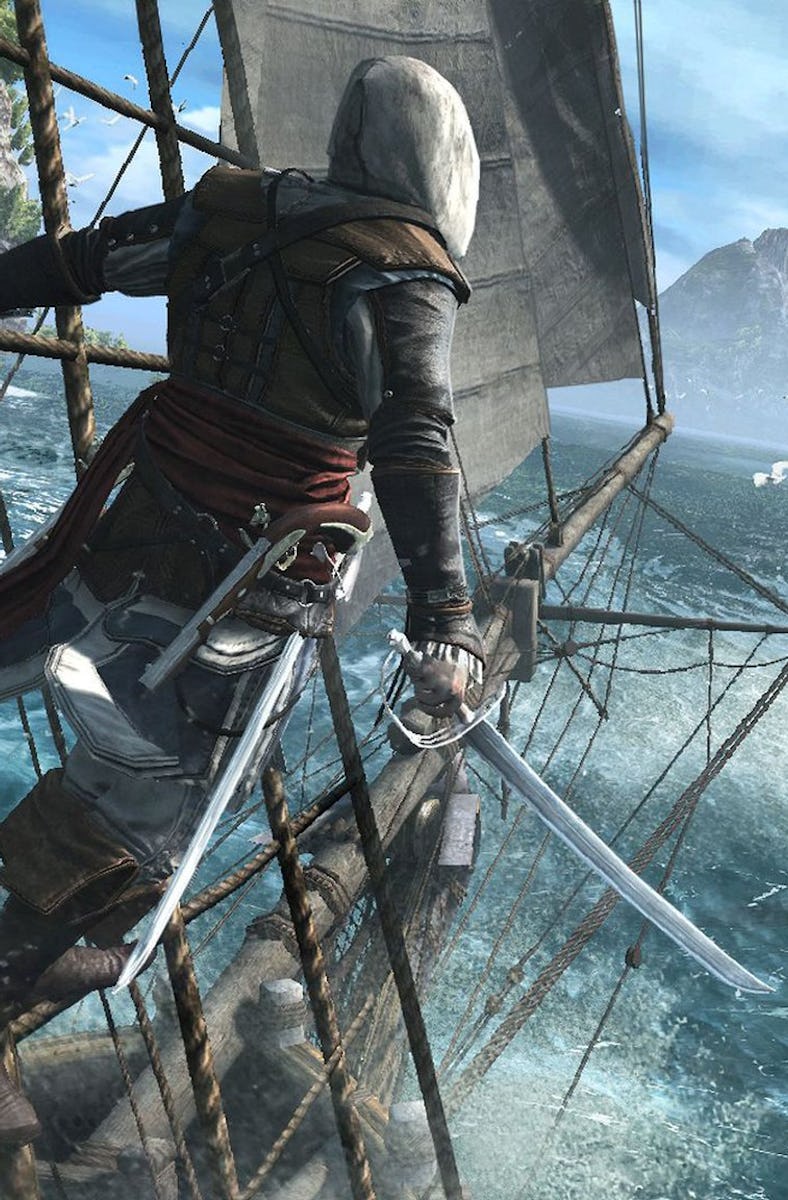10 Years Ago, Assassin’s Creed Made a Shocking Pivot That Totally Paid Off
A pirate’s life for me.

In any conversation about the best Assassin’s Creed game ever made, Assassin’s Creed IV: Black Flag (the sixth main entry in the series, despite the Roman numeral) will inevitably come up. The adventures of Edward Kenway continue to live large in the minds of franchise fans, even a decade after its release. Despite not being a great assassin game, Black Flag remains beloved. That’s because it’s one hell of a pirate game.
There was a time when Assassin’s Creed was as much about the convoluted modern-day story of protagonist Desmond Miles as it was about frolicking through gorgeous historical settings. The first five entries in the series surrounded Desmond’s mission to stop the end of the world by collecting clues and technology from the memories of his ancestors through the Animus machine. But at the end of Assassin’s Creed III, Desmond kicks the bucket, and the world is seemingly saved.
Life on the sea is filled with danger and excitement.
Ahead of Black Flag’s release, there were many questions about what the future of the franchise would be. After five games, the series already felt repetitive (a problem it seems impossible to escape even today), and the grand narrative of Desmond was tied off with a bow. Black Flag took this as a chance for a new start — one that took bold risks.
The modern setting returns without Desmond as players take the role of an unnamed faceless Abstergo employee. While the modern sections of past games were already divisive, Black Flag proved the only thing that made these sections work at all was Nolan North’s charismatic performance as Desmond. Without Desmond, the modern vignettes feel even more convoluted and unexciting. The changes within the Animus, however, were a completely different story.
Black Flag takes players to the waters and islands of the Caribbean during the Golden Age of Piracy. While past games were defined by sprawling cities that allowed for the franchise’s signature parkour, Black Flag offered tropical islands full of trees and blue oceans as far as the eye can see. In a massive change, a large swath of the player's time would not be spent running on rooftops but sailing through the sea.
While the central conflict between the Assassins and the Templars is woven throughout Black Flag, the typical Assassin’s Creed nonsense takes a backseat to the sailing mechanic of the game. Lifted from Assassin’s Creed III and expanded upon, Black Flag is truly about the ship Edward sails with his crew.
Every sea shanty in Black Flag is a certified banger.
Edward — and by extension, the player — is a pirate much more than he ever is an assassin. The moments from Black Flag that remain etched in players’ minds are those spent on the open sea. Diving for treasure on the ocean floor, large-scale ship combat, singing sea shanties with your crew — these moments define Black Flag. Not a single assassination mission stands out the way they do in games that came before Black Flag.
The open structure that came from the central fantasy of being a pirate was met with high praise upon its release. Official Xbox Magazine’s review of Black Flag called it “exactly the shot in the arm Assassin's Creed needed.” The gamble of going against the core tenants of the franchise paid off.
2018’s Odyssey feels like the closest thing to Black Flag the franchise has gotten in the past decade. The wide-open Greek setting full of activities not limited to parkour and assassination (and including plenty of sailing) is another freeing title that remains a fan favorite. 2020’s Valhalla includes its own sailing, but the restrictive rivers of England lack the freedom offered by the oceans of Odyssey and Black Flag.
Assassin’s Creed IV: Black Flag instilled a lesson that the best entries in the franchise continue to learn from: a good Assassin’s Creed game doesn’t have to be a good assassin game.
This article was originally published on